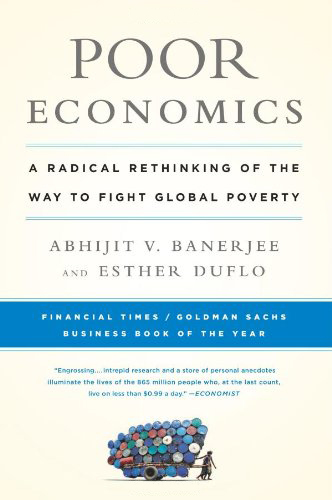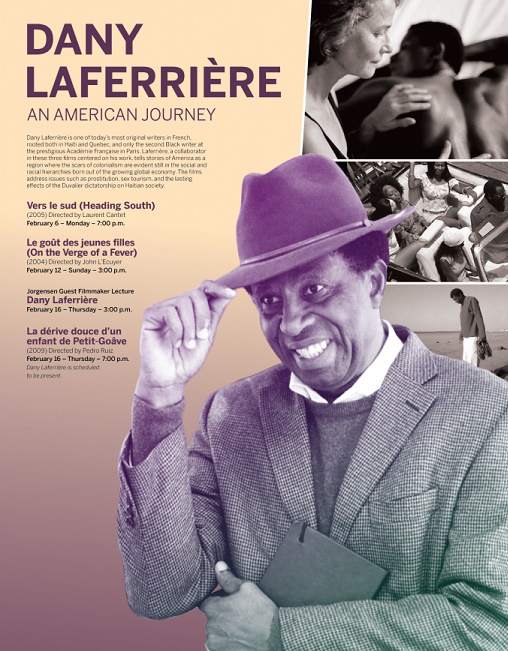
Like the well-known Freakonomics, Poor Economics is a practical rather than theoretical economics book. In its study of worldwide poverty and the effects of anti-poverty programs it relies heavily on empirical data, especially “randomized controlled trials” where available.
So what are “randomized, controlled trials” in this context?
Let’s say you want more poor people in some malaria-prone area of Africa to use bed nets so they won’t be bitten by infected mosquitoes, but you’re not sure what is the most effective way to make this happen.
Maybe the less expensive they are, the more people will obtain and use them, to the point that giving them away completely free is the most effective approach. Or maybe the cheaper they are the more people will assume they must not be valuable and so it’s actually counterproductive to provide them free or nearly free.
Will people be more inclined to use them if urged to by the right people in the right ways? Who would be most effective as such persuaders or authority figures: doctors, religious leaders, neighbors and friends, men, women, white people, government officials? How should the message be transmitted in order to be most effective: in person in group meetings, in person in house-to-house visits, in print, through the media, in fictional contexts such as through popular soap operas on TV?
What you could do is take communities that seem to be similar in all relevant respects, use different approaches with them, and observe the results.
So, maybe in one village you have visiting doctors give away bed nets, explaining their proper use to the recipients. In another village you let the market determine the price, and you have teachers in the schools teach kids about how they lessen the spread of malaria. In another village, you have government officials post notices prominently throughout the village about the importance of using bed nets, and you have the government officials provide them themselves to those who come and request one. In another village you subsidize local stores to provide them at half price, accompanied by displays of hot women in bikinis using bed nets. And so on.
Then after a time you follow up with questionnaires and polls to see how many people in each of the villages have obtained bed nets, how many are actually using them, and what reasons they give for using or not using them (e.g., “I couldn’t afford one,” “I never heard of bed nets,” “Our pastor said only devil worshippers use bed nets,” “I don’t think they’re any good because my cousin used one and got malaria anyway,” etc.), which will give you at least some evidence as to what works and what doesn’t.
Throughout Poor Economics, the authors discuss various such randomized, controlled trials and their results, along with anecdotes telling the stories of poor people in various countries around the world, so that we can better understand what poor people do, why they do it, and what is most likely to be effective in improving their lives.
Broadly speaking, there is much debate in the literature over whether intervention in the lives of the poor is ever a wise anti-poverty policy, or if a laissez faire, market-oriented, hands-off approach is best. (One infuriating thing about the latter position, by the way, is the way it treats Ayn Rand-style capitalism as somehow a neutral, default position of maximal freedom, as if capitalist theories of property are simply non-controversial truths, and the enforcement of contracts and all the various theoretical rights of property involve no restrictions on freedom.)
It is commonly argued on the pro-intervention side that there are “poverty traps,” i.e., life situations where there’s little or nothing one can realistically do to get out of poverty. Situations, in other words, where if things are left well enough alone in some pro-capitalist fashion, the rich will get richer and the poor will get poorer. Thus the necessity, it is argued, for programs that give some form of assistance to those who are not in a position to simply “bootstrap” themselves into a better life.
You might be in a poverty trap, for instance, if the only way you can survive a crisis is to borrow money from loan sharks, and if crises occur often enough that regardless of how much of your time you spend in income-generating activities available to you, you will never be able to get out of the hole because of the enormous interest payments.
Or maybe you are in a poverty trap because the only way you can generate enough income to get out of poverty is to have the physical strength, stamina, initiative, self-discipline, etc. that requires a certain level of physical and emotional health that is dependent on getting more calories and better nutrition than you can currently afford. (Much like the aging fighter in Jack London’s A Piece of Steak who couldn’t afford the steak that would have enabled him to win the fight that would have made his boxing career lucrative enough to enable him to afford things like steak.)
One of the main things Poor Economics addresses through its empirical research is whether such poverty traps exist, and whether therefore assistance to poor people from governments and from anti-poverty non-governmental organizations and such is beneficial or harmful (and, of course, what kind of assistance, if any, is most effective).
I won’t try to summarize all the specifics of their findings, but not surprisingly it turns out that no simplistic, ideologically pure, approach works for all poor people in all circumstances. In some cases the “leave it be and let the market take care of it” approach seems the most promising, and in some cases some deviation from that seems the most promising.
But along the way there is much intriguing analysis about the lives of the poor, and the psychology and sociology of being poor.
Consider the concept of “time inconsistency.” According to multiple online sources I checked, it’s an economics term that means simply having contradictory beliefs at different times. For example, you decide to purchase a certain item, and then later when you’re in the store you change your mind and decide not to.
I never studied economics. I’m familiar with some of the basic ideas and concepts that I happen to have picked up from other reading, but I don’t recall coming across this one. It’s basically the same idea, though, as one of the fallacies I taught about in critical thinking classes long ago.
The authors present it a little differently. Maybe they’re just spelling it out a bit more, or maybe focusing on just one version, but they write of “time inconsistency” as the psychological tendency to give greater weight to present factors rather than future (or past I suppose) factors.
So if there’s something unpleasant we need to do, we’re apt to put it off, because experiencing it right now seems worse than experiencing it tomorrow or next week does. That is, instinctively it feels that way; intellectually we may well recognize that “pay me now” or “pay me later” will be equally painful.
Our decisions are not solely products of our intellect of course, so we routinely favor our present self over our future self in what we do. Delayed gratification and such are virtues we struggle to live by; our nature pushes us very much in the other direction.
So the flip side of the tendency to put off bad things is the tendency to seize good things immediately. For example, saving requires overcoming an internal resistance that spending does not, because a current impulse (a desire for what that money can bring today) influences us more than our expectation of a future impulse (a desire for what that money can bring later, like when we’re retired).
Time inconsistency isn’t unique to the poor, but of course they’re no more immune to it than anyone else. A lot of what they do that is not in their best interests turns out to be a result of this very common psychological tendency.
One thing the discussion of time inconsistency brought to mind for me is how nicely it analogizes to a basic principle of morality.
Think about it. Even though presumably all of your various “selves” across time from birth until death are of equal value (all else being equal, that is; I’m sure one could come up with all kinds of indirect reasons that happiness at time A will do you more good than happiness at time B, or experiencing some trauma at time C will be worse than experiencing it at time D), you routinely make decisions throughout your life as if that were not the case or you did not realize it was the case. Your present self just seems so much more important. It’s hard to resist the temptation to grab a small pleasure now at the cost of greater pain later, rather than to accept some small pain now so as to put yourself in position for a greater pleasure later. Part of becoming a wiser, more mature person is not only recognizing the equal value of your future selves compared to your present self, but having the self-discipline to live in accordance with this realization.
Well, it’s basically the same thing across people as it is across time. Pretty much all moral systems except ethical egoism (i.e., the Ayn Rand “fuck anyone who’s not rich like me” blather) agree that “all persons are created equal” (and there’s even a sense in which ethical egoism agrees with this—all, not just some, people are equally entitled to live their lives as selfish assholes if they please), so what happens to one is of equal weight to what happens to any other. The fact that the one happens to be you is of no relevance. All else being equal, you starving to death, the fellow down the street starving to death, or the peasant woman starving to death in China (or for that matter, the indigenous woman starving to death in Peru thirty years from now due to famines brought on by climate change) are all of equal moral weight.
That means that ideally the decisions you make in life will not favor you over others, just like they shouldn’t favor your present self over some future self of yours. And part of becoming an ethically mature person is not only recognizing this, but living in accordance with it.
Unfortunately, I dare say that giving others equal weight as yourself is even harder—a lot harder—than giving your future self equal weight as your present self. Indeed, one way to think of love is as the absence of this tendency to favor yourself. You know you really love someone when you instinctively give them and their interests at least as much consideration as you give yourself and your own interests, and that’s something that in its purest form probably very rarely if ever happens. Most of us at best approach it in our relationships with the very small number of people we are closest to—maybe a spouse, one’s children, etc.—but to genuinely lack the natural tendency to give oneself more weight than total strangers and the like is a truly saintly status that must function as an unattainable ideal to strive to come closer to rather than a realistic goal to reach.
Yet it’s morally obligatory, and I would say, with Kant, that it’s rationally obligatory, as morality is fundamentally rational. This fits perfectly with its being analogous to time inconsistency. It isn’t (just) a moral inconsistency but a logical one to favor your present self over your future self (as natural a tendency as that is for almost all of us until we fight to change it). It is very much the same type of contradiction to favor yourself over Joe Schmo.
Moving on, another “moral philosophy” point that came to mind reading Poor Economics is the question of whether this economics focus on “what works” doesn’t leave out some other relevant considerations.
That is, economics, at least the practical economics approach of Poor Economics, takes a certain goal (e.g., increased use of bed nets against malaria), and studies how effective various means are in achieving that goal. I don’t doubt that that approach can be quite useful, but I see two potential moral problems with it.
Number one is that it implicitly treats people as causal mechanisms, examines what inputs generate what outputs, and declares success or failure based on the results. But many moral philosophers would object to this purely consequentialist approach, contending that there are other moral factors that need to be taken into account.
I’m thinking, for instance, of issues of merit and justice, or how well or poorly the distribution of benefits matches what people deserve. When we’re talking about the very poor getting the minimum necessary to live something other than a pathetic, miserable life then arguably we just want to get everybody above a certain level—everyone “deserves” at least that much—but beyond that I think we have to look at something other than results alone.
Let’s think of it in terms of a hypothetical randomized, controlled trial.
Two similar communities are chosen to test what policies are most effective in enabling poor entrepreneurs to do well enough to break out of a poverty trap and reach some stable economic status above the poverty line.
In the first community, businesses are given small bonuses along the way when they meet certain socially desirable criteria, such as minimizing pollution and other undesirable externalities, paying their workers a living wage, etc.
In the second community, the local government bigwig bestows advantages on businesses run by women he finds attractive who are willing to make themselves sexually available to him.
In the first community, 20% of new businesses are successful enough within the first three years to lift their principals out of poverty. In the second community, 35% of new businesses are.
So evidently the second policy “works” better. But is that really all there is to it? Is that all that matters in assessing these policies?
Number two, might there be longer range and indirect or subtle consequences that aren’t sufficiently taken into account with this approach?
This is probably not the best example, but I remember being vaguely troubled long ago when I happened to look at a McDonald’s order ticket and noticed that the words the cooks would need to read were spelled incorrectly—specifically they were spelled phonetically (e.g., “letus” for “lettuce”).
Now if we look at this purely in terms of what “works,” then it wouldn’t surprise me at all if this were an effective policy. After all, at this level of labor we’re talking about workers who are disproportionately poorly educated, stupid, and/or don’t have English as their primary language. It may well be that fewer mistakes are made, less time is taken up with asking questions and seeking clarification, etc. when words are spelled phonetically like that, with the result being both that the employees do better at their work and are more likely to keep their jobs and income, and that the employers’ businesses do better. So everyone’s happy.
Except, it seems to me, the policy contributes a tiny bit to the overall dumbing down of society. Basically the policy takes people as they are and lowers the standards to fit them (“the dummies can’t spell, so let’s make it so they can still do the work anyway”), whereas I would think in the long run it is generally better to keep the standards somewhere other than rock bottom and help people to improve themselves so as to be able to reach them. (I know, I know, that’s not the responsibility of McDonald’s. But we can care about these things even if McDonald’s as a business doesn’t.)
I’m sure the workers themselves don’t give a crap one way or the other, but it’s not clear that in the long run this policy is even good for them. One of the main ways you learn something like spelling is by seeing words spelled correctly throughout your life, so that then when you write them yourself you have that vague “this looks right” or “this looks wrong” sense. If you spend a few months or years seeing “letus” every day, it’s not going to “look wrong” when you later write the word yourself in real life. So the policy adds just the tiniest impediment to becoming a better speller.
That’s an extremely trivial example I know, but I think there’s a potentially significant principle at stake here, which is that focusing on what “works” in some short term, measurable sense may underrate the importance of certain undesirable, unintended, and/or unpredictable consequences.
The authors bend over backwards in Poor Economics not to blame the poor for their poverty, pointing out that when you take into account their circumstances, their decisions that seem irresponsible or irrational actually aren’t.
I think that’s more true than not, but probably not as true as they insist. In fact I’d say some of their own examples point the other way.
But then there’s also the question of how deep you want to go. One could say—and they do—that a lot of the bad decisions the poor make are influenced by factors beyond their control that in effect make them bad decisionmakers (e.g., they’re more likely to have been born to mothers who did not receive good prenatal care, to be distracted by hunger, to be under stress, and so on). So in that sense you can make the case that even when they screw up it’s sometimes not their fault, though if you go all the way down that road you ultimately deny all free will and moral responsibility, which may or may not be where you want to end up.
My take, just from a few decades of anecdotal observations, is that poverty is indeed correlated to a significant degree with traits like laziness, stupidity, mental illness, and poor impulse control, among others.
But it’s not as if everyone starts equal, and then the fuck ups gradually drift to the bottom and the diligent, hardworking, intelligent go-getters willing to delay gratification gradually earn their way to the top. No system yet devised by humans, definitely including capitalism, is remotely just in that sense, and while there’s some correlation between being a fuck up and being poor, it’s far from absolute.
Not to mention there are positive traits that appear to be correlated with being poor. I’d say, all else being equal, that if you have one person who puts various moral constraints on himself as far as how dishonest he is willing to be, how much he is willing to exploit people, etc., and one person who doesn’t, the first person is more likely than the second to be poor. Moral assholes tend to congregate at the top, that is.
People who aren’t materialistic, and who favor things like quality time with their family or devoting much of their time and energy to volunteer work to help others are also obviously less likely, all else being equal, to do as well financially as those who don’t.
So it’s not all bad stuff you find more prevalent toward the bottom than toward the top.
Furthermore, I’d say the “punishment” for bad decisions is worse the poorer you are. Whether you have any sympathy or not for some teenager who gets drunk and causes an accident that injures or kills someone, or one who is too undisciplined to stay out of trouble at school and avoid being expelled, the fact is if he or she is living in a ghetto and messes up like that there’s a pretty good chance their life is over, whereas if they’re the child of a millionaire or billionaire, they’re almost certain to get a second (and third, and fourth, and possibly fortieth) chance. Same irresponsible decisions, same stupid behavior, very different consequences for no defensible reason.
The conclusion of Poor Economics provides a useful summary of five of the main themes or lessons the authors believe are supported by the evidence they gathered. So I’ll end with a quick mention of these five points, as that will probably give as good a sense of the contents of the book as anything.
One, people in general and the poor in particular do not operate from some position of ideal knowledge. A lot of the poor decisions people make are traceable to their lacking certain information or their having certain false beliefs. (I would add that one of the most stunningly evil things about humanity is how frequently such ignorance or error is intentionally brought about by some party that will benefit from it, and for that matter how for the most part many folks see this as perfectly OK, or just some inevitable element of “how things are,” or “how things work.” Marketing being the most obvious example.)
Two, we tend to lose sight of just how much responsibility is—paternalistically and beneficially—taken out of the hands of rich people compared to poor people, or people in rich countries compared to people in poor countries. A poor person in some godforsaken hellhole country is far, far less likely than the average person reading this book to have indoor plumbing with a clean and healthy water supply that they don’t have to treat with separately obtained chlorine themselves, fluoride in that water that lessens the damage of not keeping up with recommended dental work, a nationalized health care system that relieves them of having to obtain health insurance as an individual, a small percentage of their wages set aside automatically for their old age so they don’t have to have the discipline and foresight to set up and stick to their own such long term savings plan, and so on.
Three, conditions often make it the case that the free market alone does not “naturally” meet the needs of the poor. For things like savings accounts, loans, and certain kinds of insurance, either they are unavailable to the poor, or only enormously less valuable versions are available to them compared to what is available to other people.
Four, even in some utterly corrupt or oppressive country where the likelihood of achieving major improvement to the lives of the poor without the entire regime changing is basically nil, there are still often opportunities to do more modest good. There are plenty of examples of determined people making a significant difference for the better in many poor people’s lives even in the most seemingly hopeless countries.
Five, self-fulfilling prophecies are a strong force in the lives of the poor. If you can help just enough to provide some role models of success—to upend the notion that there’s no point in trying since we’re all stuck in poverty anyway—these can quickly multiply as you get people believing in themselves and their future.
Advertisements Share this:





